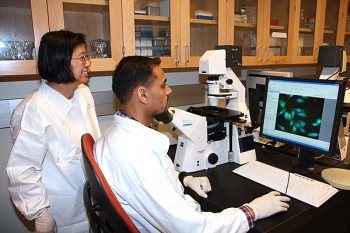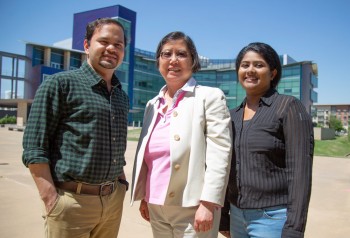Postdoc - Molecular Genetics & Molecular Biology
MIT - 1995

Li Zhang
Cecil H. and Ida Green Distinguished Chair in Systems Biology Science
Professor - Biological Sciences
Professional Preparation
Ph.D. - Biochemistry
University of California, Los Angeles - 1990
University of California, Los Angeles - 1990
B.S. - Chemistry
Zhongshan University, China - 1984
Zhongshan University, China - 1984
Research Areas
Research Interests
I have served as an independent research investigator and a faculty member at NYU School of Medicine, Columbia University School of Public Health, and UT Dallas for 25 years. My lab has published an array of original research articles elucidating heme signaling, gene regulation, and lung tumorigenesis. My work on heme signaling is noted and included in the 2009 Wiley Encyclopedia of Chemical Biology. I have also edited and published two editions of a book entitled "Heme Biology.” This book has been translated to Korean. Below I outline my major contributions. (1) Understanding heme and mitochondrial functions in lung cancer progression. Recent research in my laboratory supported by CPRIT academic research awards has demonstrated that elevated heme availability is key to the development and progression of lung cancer. Our work has led to the publication of two recent major research articles in the AACR flagship journal Cancer Research: One 2019 paper entitled “Elevated heme synthesis and uptake underpin intensified oxidative metabolism and tumorigenic functions in non-small cell lung cancer cells” (with an Altmetric score of 69) and another 2020 paper entitled “Oxygen-Enhanced Optoacoustic Tomography Reveals the Effectiveness of Targeting Heme and Oxidative Phosphorylation at Normalizing Tumor Vascular Oxygenation” (with an Altmetric score of 58). These research results strongly support the idea that heme sequestration can be an effective strategy for the suppression of lung tumors and other drug-resistant tumors. These results were highlighted by Cancer Research in the September 1 issue (Cancer Res 2020;80:3461–2).(2) Illuminating the molecular mechanisms underlying the neurological defects associated with altered heme metabolism and Alzheimer’s disease.Recently, we have analyzed the changes in heme metabolism and flux during neuronal differentiation and in samples from human patients and mice with Alzheimer’s disease phenotypes. Some of this work was published in an article entitled “Amyloid b perturbs elevated heme flux induced with neuronal development” in Alzheimer's & Dementia: Translational Research & Clinical Interventions. Experiments are underway to illuminate the heme regulatory network underlying the etiopathogenesis of Alzheimer’s Disease. Previously, my lab has carried out research to determine how heme deficiency and environmental neurotoxicants affect brain functions at the molecular level. We found that neuronal signaling, such as that mediated by the Ras-ERK signaling pathway, requires heme. We showed that heme is critical for neuronal differentiation and survival. Our work has now been confirmed in animal models. Our work provides a molecular explanation for the neurological symptoms associated with acute porphyrias. Our work also provides the first study examining the effects of common neurotoxicants, Mn and pesticides, on primary human astrocytes.(3) Elucidating molecular mechanisms governing heme signaling in eukaryotes.I started my investigation of heme signaling and regulation in the latter part of my postdoctoral research in Professor Guarente’s lab (MIT). After I became an independent investigator, my lab published a series of papers on the molecular mechanism governing heme regulation of the heme activator protein Hap1. The Hap1-heme system provides an excellent paradigm for understanding how cells sense heme and promote heme regulation of diverse molecular and cellular processes. Our studies on the Hap1-heme system have become a classical example of how heme mediates cellular signaling and gene regulation. Since my work, studies of heme signaling and regulatory functions have attracted more and more researchers. The approaches used in our published work are being used by many researchers working on heme signaling. Our latest work on the Gis1 protein further broadens the importance of heme in controlling cellular processes.(4) Understanding the function of molecular chaperones in cell signaling. Molecular chaperones control fundamental physiological processes, such as stress response and adaptation, and disease processes, such as tumor development. My lab was the first to identify a native substrate (Hap1) of Hsp90 and Hsp70 molecular chaperones in yeast. This was important because yeast provides an invaluable tool to study the functions of molecular chaperones. As such, we discovered novel mechanisms of chaperone action. Our 2001 MCB article was featured by Science Magazine’s STKE web journal as a noteworthy development.(5) Deciphering molecular mechanisms governing oxygen signaling and regulation. Oxygen is important for cellular bioenergetics, and hypoxia is implicated in common diseases, such as stroke and cancer. My lab has carried out a substantial amount of work to understand how eukaryotic cells sense oxygen levels and respond to changes in oxygen levels. My lab has published a series of work on oxygen regulation in yeast and mammalian cells. We performed several genomic, proteomic, and computational studies to elucidate mechanisms of oxygen regulation.My lab’s research work on lung cancer and Alzheimer’s disease has the potential to fundamentally advance these research fields. We have 3 research articles published in 2020, and two more have been submitted. I have secured one new CPRIT academic research award, and I am an inventor for a UTD-submitted patent. I have co-founded a company to realize the commercial potential of this IP. I believe that my lab is poised to make fundamental contributions to basic research and therapeutics.Publications
Preexisting Genetic Background Primes the Responses of Human Neurons to Amyloid β 2025 - Journal Article
A Primary Care Group Resilience Intervention Promotes Child and Caregiver Behavioral Health 2025 - Journal Article
Putative Molecular Mechanisms Underpinning the Inverse Roles of Mitochondrial Respiration and Heme Function in Lung Cancer and Alzheimer’s Disease 2024 - Journal Article
A Primary Care Intervention to Promote Child and Caregiver Resilience: A Pilot Study of the Redesigned Resilience Clinic (Preprint) 2024 - Other
The Neural Palette of Heme: Altered Heme Homeostasis Underlies Defective Neurotransmission, Increased Oxidative Stress, and Disease Pathogenesis 2024 - Journal Article
A Primary Care Group Intervention to Promote Child and Caregiver Resilience: A Pilot Study of the Redesigned Resilience Clinic (Preprint) 2024 - Journal Article
Supplementary Fig S5 from Heme Sequestration as an Effective Strategy for the Suppression of Tumor Growth and Progression 2023 - Other
Supplementary Fig S6 from Heme Sequestration as an Effective Strategy for the Suppression of Tumor Growth and Progression 2023 - Other
Appointments
Professor and Head
University of Texas at Dallas [2007–Present]
University of Texas at Dallas [2007–Present]
Associate Professor
Columbia University [2004–2004]
Columbia University [2004–2004]
Professor
Columbia University [2004–2007]
Columbia University [2004–2007]
Associate Professor
New York University [2001–2003]
New York University [2001–2003]
Assistant Professor
New York University [1995–2000]
New York University [1995–2000]
Postdoctoral Fellow/Associate
MIT [1991–1995]
MIT [1991–1995]
Graduate Student Researcher
University of California, Los Angeles [1986–1990]
University of California, Los Angeles [1986–1990]
Additional Information
Honors
- 1985-1986 P.R. China Fellowship;
- 1985-1990 UCLA Non-resident Tuition Fellowship;
- 1991-1993 The Jane Coffin Childs Fellowship for Medical Research;
- 1999-2003 The Monique Weill-Caulier Medical Scholarship;
- 2006 Top 1% of cited authors for journals in Molecular Biology and Genectics & Madison Whos Who;
- 2007- The Cecil H. and Ida Green Distinguished Chair of Systems Biology
News Articles
Biologists Book Explores Role of Key Blood Component
 Heme is the iron-containing molecule in hemoglobin that gives blood its deep red hue and binds to oxygen, allowing for its distribution throughout the body. “The field has progressed significantly throughout the last decade,” Zhang said. “It’s something I’ve studied for years now, and I thought it was the right time to work on this project.” Throughout her more than 15-year career, Zhang has made significant contributions to the field of molecular biology—particularly in the study of heme signaling and its role in tumor development, shortage of blood supply to tissues in the body and defective heme synthesis.
Heme is the iron-containing molecule in hemoglobin that gives blood its deep red hue and binds to oxygen, allowing for its distribution throughout the body. “The field has progressed significantly throughout the last decade,” Zhang said. “It’s something I’ve studied for years now, and I thought it was the right time to work on this project.” Throughout her more than 15-year career, Zhang has made significant contributions to the field of molecular biology—particularly in the study of heme signaling and its role in tumor development, shortage of blood supply to tissues in the body and defective heme synthesis.
UT Dallas Study Suggests New Approach to Fighting Lung Cancer
 Recent research has shown that cancer cells have a much different – and more complex – metabolism than normal cells. Now, scientists at The University of Texas at Dallas have found that exploiting these differences might provide a new strategy to combat lung cancer.
Recent research has shown that cancer cells have a much different – and more complex – metabolism than normal cells. Now, scientists at The University of Texas at Dallas have found that exploiting these differences might provide a new strategy to combat lung cancer.In an article published online May 21 in the journal PLOS ONE, UT Dallas researchers compared the metabolic characteristics of “non-small-cell” lung cancer cells with normal lung cells taken from the same patient.
Health Science Researcher to Head UT Dallas’ Department of Molecular & Cell Biology
The University of Texas at Dallas has appointed a noted Columbia University professor of environmental health sciences to lead the Department of Molecular & Cell Biology.Dr. Li Zhang will also hold the Cecil H. and Ida Green Distinguished Chair in Systems Biology Science. She starts work Nov. 1.
Zhang will succeed Dr. Donald Gray, who has headed the Department of Molecular & Cell Biology for three years and previously from 1985 to1995.
University Biologists Design New Molecules To Help Stall Lung Cancer
 University of Texas at Dallas scientists have demonstrated that the growth rate of the majority of lung cancer cells relates directly to the availability of a crucial oxygen-metabolizing molecule.
University of Texas at Dallas scientists have demonstrated that the growth rate of the majority of lung cancer cells relates directly to the availability of a crucial oxygen-metabolizing molecule.In a preclinical study, recently published in Cancer Research, biologist Dr. Li Zhang and her team showed that the expansion of lung tumors in mice slowed when access to heme — the oxygen-binding molecule in hemoglobin — was restricted. The researchers also showed that those same cancers grew faster when more heme was available than normal.